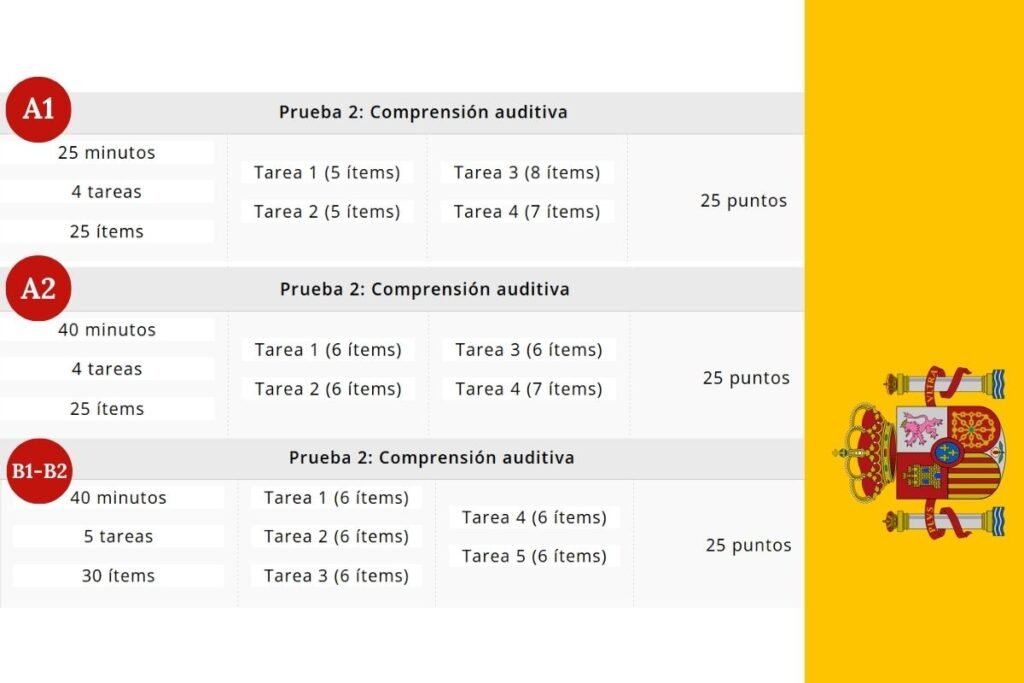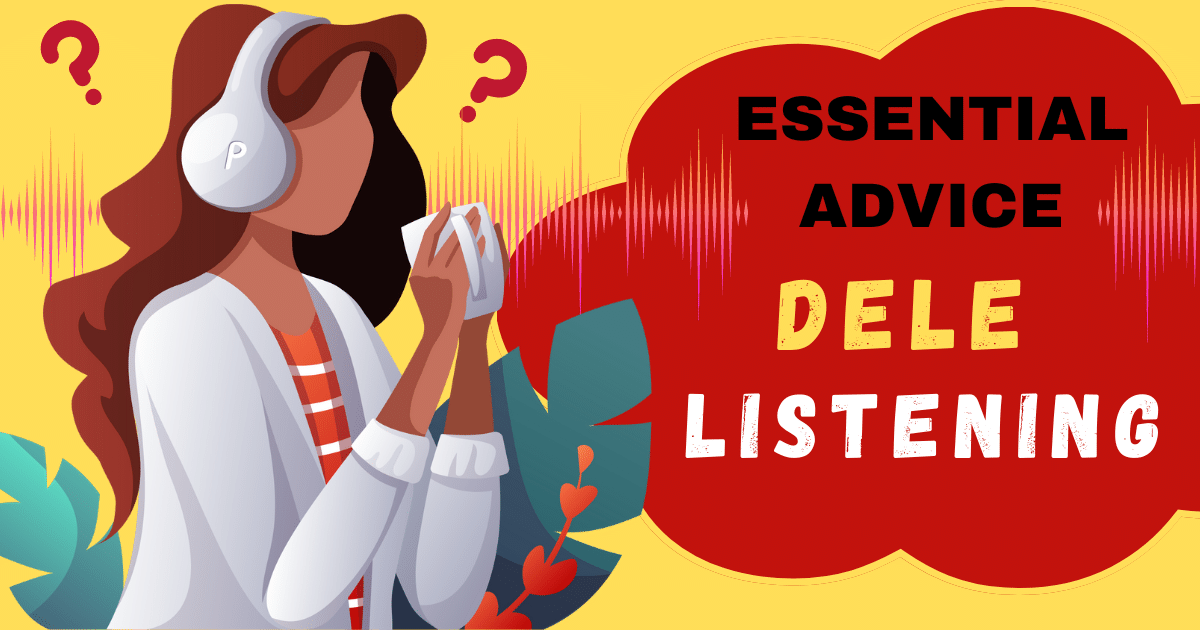If you’re learning Spanish, you’ve probably heard of the DELE exam. You can read more about what DELE is and how to apply in our article dedicated to that topic. Today, however, we’d like to give you our essential advice on how to pass one specific part of the exam. DELE Listening part can be tricky for a lot of students for a number of reasons.
For instance, a lot of students will say that they struggle to understand different accents. This is definitely an area that can be improved upon, but it’s usually not the main issue. In our experience, being unable to extract information accurately and effectively from the audio is the biggest setback. This is what makes you feel like you’ve got no control over the outcome and the exam itself. In the end, it’s what affects your score the most as you’re expected to answer questions based on what you hear.
Worst of all, time is of the utmost importance in DELE Listening. Getting held up at one missed answer, can quickly make you lose time and other essential information.
So what is the solution? Is it just the matter of practice or is there more to it?
Over the years of experience with DELE preparation, we’ve found that developing the right strategies is the key. Without it, all the practice in the world won’t be nowhere near as effective.
In the continuation, we bring you tips, tricks and strategies on how to pass your DELE listening part – with flying colors.
WHY DOES DELE TEST YOUR LISTENING
If you have ever wondered why language exams test your listening, we are here to answer it for you.
Studies have shown that listening makes up about 45% of the time people spend communicating, and listening happens to be the first linguistic skill that we develop as children. As such, it’s a crucial aspect of language acquisition and effective communication.
In language learning, listening is vital because it provides the learner with accurate (ideally) input. If the input is introduced at a right, comprehensible level, listening will develop learner’s overall comprehension aka understanding of language. Without listening, language learning cannot begin nor occur.
This is why any foreign language exam will always test your listening as a way to test your ability to navigate in the most natural linguistic context.
Additionally, it is important to differentiate between hearing and listening. Many students spend years hearing their target language, “immersing” themselves in it, without actually realizing that listening input must be listened actively.
Kline (1996) states that being aware of the difference between hearing and listening is an
Yıldırım, S., Yıldırım, Ö. (2016). The importance of listening in language learning and listening
important feature for learning and teaching listening effectively. He describes the
difference as follows: “Hearing is the reception of sound, listening is the attachment of
meaning to the sound. Hearing is passive, listening is active”
comprehension problems experienced by language learners
To learn more about how to effectively use listening in language learning, you can check out our article on that topic.
Today, however, we’ll focus on the particularities of the DELE listening part specifically.
DIFFERENT LEVELS, DIFFERENT RULES
Before anything, it’s important to note that different things are expected of you at different levels. DELE follows CEFR descriptors and you can apply for any level from A1 to C2. As you can imagine, A1 is going to be a lot easier than C2. Regardless of the level of difficulty, pruebas test your knowledge in almost the same way, with some differences.
So let’s see what those differences are and what you can expect from your level of choice.


If we compare the structure of different levels, we can see that the average time required for testing listening skills is 40 minutes.
Similarly, the listening test is split into 4-6 smaller tasks. Some of those tasks, like multiple choice answer, don’t change between the levels and are pretty straightforward. But as you can expect, both the audios and the tasks get more complex the higher the level.
We won’t be getting into too much detail, as you can download the desired level of exam from the Instituto Cervantes website. Instead, we’re going to point out some major structural differences to keep in mind before applying.
DELE C1 AND C2 HAVE INTEGRADED LANGUAGE SKILLS
You might be looking at the exam structure and wondering what on earth is happening at C2. Not only is there a higher amount of points to be gained, there’s also quite a number of tasks. So why is C2 so different?
The C2 level is the only DELE exam that consist of three instead of four parts. This is because all of C2 tests are destrezas integradas – integrated skills. Meaning, C2 will always test you on more than one language skill within the same part of the test. This is the most natural simulation of how linguistic skills are used in real-life situations by natives which suggests that these levels are reserved for native-like fluency.
When it comes to the listening part, it is combined with the reading part. Therefore, the first three tasks belong to the reading part and the last three to the listening part. It’s also relevant to mention that the topics at C2 are always more academic and technical. You could be listening to conferences, debates, interviews, etc.
In comparison, DELE C1 is still more communicative than academic. It’s the only other level that has integrated skills. Unlike DELE C2, the listening part is still separate from reading comprehension.
And lastly, but not least noteworthy, C1 and C2 include an extra audio in the writing part of the exam. You will have to listen to the audio on top of reading the texts provided on the topic. You will be expected to reference the audio in your text so there’s no weaseling out of that one.
So those are the biggest structural differences when it comes to the listening part of the DELE exam. The good news is – strategies for DELE listening part work just as well for all levels. So let’s get to it.
STRATEGIES FOR DELE LISTENING

First thing you should know about DELE listening part is that you will hear each recording twice.
Second thing you should know is that, as a rule of thumb, you won’t be using headphones/earphones. If your Instituto asks you to bring your own auriculares, this would most definitely be considered an isolated case.
So why is this relevant? Your sitting position, that is, how far you’re sitting from the speakers, might greatly impact you. There’s nothing you can do about this, as the sitting arrangement is decided for you. However, it’s worth mentioning that you most definitely have the right to put your hand up and ask the examiner to increase the volume.
And now let’s see what else you can do before the beginning of recording to ensure maximum result.
So let’s see what the story is about and what makes is so hard to adapt for screen.
READ THE QUESTIONS FIRST
There’s no doubt that carefully reading the instructions and questions is crucial for all parts of the exam. This sounds like a logical and easy thing to do. However, it’s harder to do than you might think when it comes to the listening part. Let’s see why that is – and what you can do about it.
Listening part is, undoubtedly, the part of the exam you have least control over. You can’t slow down or repeat parts of the recording and you can’t help it if the quality isn’t good. This can happen sometimes due to the fact that some recordings will be authentic and not recorded in a studio.
Also, bear in mind that you will be doing two things at the same time. You will be thinking about the answers while listening and maybe even taking notes in addition. Once that recording is on, that’s it. So, if you haven’t read the questions before the recording has started, you will struggle to keep up. What happens most often is that the students focus too much on reading and miss the audio, or vice versa.
That being said, there’s little to no time to read all the questions before the actual beginning of the exercise. However, you can scan the questions and train your eye to extract key words very quickly. This is done through high reading skills and achieved with high levels of comprehension because you won’t have time to wonder about unknown words. This is why all your linguistic skills need to be equally developed and ideally, your language should be at an even higher level than the level at which you are taking the exam.
Another method that works for some students, is to spend the first time listening the audio, reading the questions and linking them to the audio only to catch and write down the supposed answers. It’s the second time that you can then check your answers and listen in more carefully.
10 MINUTE RULE FOR DELE C2 LISTENING
Even though it is by far the most challenging level, there is one good news about DELE C2. We’ve already learned that C2 is the only one that consists of three, instead of four parts.
As a consequence, the reading and the listening part will be handed to you in the same booklet. Why is this handy (no pun)? Because they are in the same booklet, you will be able to read auditory-related questions more thoroughly beforehand.
And this is where our first tip comes in. We recommend our C2 students to complete the reading comprehension part within no more than 50 minutes. This will leave you about 10 minutes to carefully read the questions for the listening part. The listening part will take 45 minutes, around 15 minutes per each one of three tasks.
In addition, we also recommend that you highlight what you believe to be key words and ideas while at it. This goes for all levels.
USE THE IN-BETWEEN TIME
As for the A1-C1 levels, once the reading comprehension part is over, the examiner will pick up the first booklet. They will hand you the second booklet, which is your listening part. Don’t wait until the official start of the second part. Instead, use the time between the examiner walking around the classroom collecting booklets and the beginning of the exercise to read the questions.
You can write and underline as much as you want on the booklet. Just be careful you don’t do it on your answer sheet or hoja de respuesta.
And that brings us to our next point.
TAKE NOTES
So far, we’ve already established that the preparation for the recording is as important as listening itself. We know that underlining some words and reading questions is helpful and will allow us to focus on listening. But is there something we can do during the recording itself?
As mentioned previously, you will hear each recording twice. Great, you might be thinking. If you missed something the first time around, there’s always the second round. That’s where you’d be wrong.
Over the years, we’ve had some students who came out of the exam frustrated with the listening part. When asked how they approached the task, they replied that ‘they just listened’ – both times. By ‘just listening,’ you miss a lot of little clues, especially if you don’t know what to look for.
This is why we recommend that you take notes during the first listen. Extract as much as possible during the first listening and use the second listening as a way to test your responses from the first time around. Understand that, for most students, and under stress, there is no time for “just listening”. Training yourself to perform optimally under the time constraint and taking advantage of every second in an active way is crucial to passing any listening exam.
But what’s the best way to do it?
KNOW WHAT TO LISTEN FOR – THEY WANT TO MISLEAD YOU
Ideally, by now you’ve read the questions, underlined some words and now it’s time to expand on it. Ojo, don’t get fixated on what you think is the right answer at this stage. Don’t listen for it and don’t choose it just because you recognize some key words. You have to train yourself to actively listen because they might be saying the exact opposite of the statement. Pay attention to the meaning, not the word itself.
As an illustration, this was one of the answers offered for the recording of an interview at C2.
En el audio se menciona que…
b) La profesora ha vivido en sus carnes la falta de respeto por parte de padres de alumnos.
This isn’t the correct answer even though we will clearly hear that parents are disrespecting teachers, in those same words:
A menudo escucho a compañeros de otros centros que me cuentan que hay padres y madres que les dicen cómo deben dar clase, e incluso les faltan el respeto.
However, by listening carefully, we’ll be able to make an important distinction. The teacher in question wasn’t disrespected personally, she only heard those stories from her colleagues.
Therefore, don’t rush or force your answers. Use the first listen to take notes and speculate about the right answer. Then use the second listen to verify your theories and choose the final answer. Apart from purposefully misleading statements, what else should you pay attention to?
KNOW YOUR SYNONYMS
Let’s imagine the best possible scenario. You’ve managed to read the questions before, you’ve taken notes and you listened carefully. Still, you feel like you’re missing something and the words you’ve underlined are not really coming up in the audio.
Most likely, this is because they’re coming up as synonyms. A synonym is a word or expression that has the same or nearly the same meaning as another in the same language.
For example, ‘big’ and ‘large’ are synonyms. Obviously, synonyms get more difficult the more advanced the level. ‘Rubicund,’ for instance, is a more elevated way of saying ‘rosy.’ In the same way, answers offered to you can be paraphrased (put differently) in the speech.
Let’s see an example of this.
One of the 5 correct statements offered in task 4, DELE C2 goes like this:
El líder da el primer paso, dirige y analiza los resultados.
This was the correct answer, meaning, we could hear this statement confirmed in the audio. However, we don’t hear it in those same words. Here is the transcript of the part containing this answer:
El líder suele tomar la iniciativa para comenzar a hacer algo. Luego, gestiona y evalúa.
Dar el primer paso = tomar la iniciativa
Dirigir = gestionar
Analizar = evaluar
As we can see, this sentence was both paraphrased and rich with synonyms. So how can you make sure that you get it right?
The best way to expand your vocabulary and, consequently, your base of synonyms, is to actively read. Reading will allow you to observe words in lots of different contexts and will get you used to the syntax of the language. This, in turn, will refine your sense for nuances in meaning and make you a more confident user of words.
But why does DELE do it in the first place, is it just to confuse you? Might be one reason. However, synonyms are more likely there to test your vocabulary and your feeling for nuances in meaning. After all, one of the key traits of someone at a very advanced level is being able to distinguish subtle nuances of meaning even in complex situations.
Same as with everything else, you can expect synonyms to get more difficult the higher the level. This is one of the trickiest and most difficult things about the listening part. You could do everything right, but if you don’t know that one synonym, you might not get the answer right.
The good news is, this isn’t the matter of some innate ability that you either have or not – it comes with years of practice and study.
WHATEVER YOU DO, DO NOT…
…get stuck on a missed answer. Chances are, you are going to mishear or miss the key moment. Sometimes, you just won’t be able to tell apart the words because the speaker is pronouncing them awkwardly or too fast. Maybe you will hear it but you won’t understand it. However, during the exam, you can’t ask for elaboration nor for the speaker to speak more slowly.
Learn to let go!
If you don’t hear it the first time around and you are unable to annotate anything, move on immediately because if you get stuck on thinking too much about that one things, time will rush by you. We guarantee you will lose other pieces of crucial information or worse, get lost in the flow of the content. Try to get it the second time, but if you are still unsuccessful, just maintain your focus and shift it immediately to listening further. Remember that audio won’t wait for you and that one or two lost points are not worth losing more.
In conclusion, DELE listening part comes with its own set of rules and challenges. Being one of the four language learning skills, listening is an essential part of any language journey. That’s why you’ll get specially tested on it at any level, albeit a bit differently.
We’ve seen the biggest structural discrepancy at C2 level, which consists of three instead of four parts like other levels. This means that listening part will be handed to you alongside the reading comprehension part. However, this will also give you an advantage of being able to read questions well before the beginning of exercise. For other levels, we recommend you read questions while the examiner is walking around the classroom collecting the reading comprehension booklet.
Apart from reading questions beforehand, there are several other key strategies that will help you get maximum result. Taking notes during your first listen is incredibly important. It will help you expand on any key words you might have highlighted and speculate about the right answer. Just don’t get hasty at this stage. We recommend that you use your second listen to confirm your speculations and theories.
We’ve also established that it is crucial not just to listen carefully, but to know what you’re listening for. Therefore, don’t expect that every word from the offered statements will come up loud and clear. More often than not, recordings will use synoyms, a different word with the same meaning. Other times, it might repeat that same word or phrase but it will actually contradict the statement.
Needless to say, this task gets more difficult with each level. The best way to ‘catch’ synonyms is to simply know a lot of them, that is, to have a vast vocabulary. The simplest, although not the easiest way to do that, is to actively read.
All in all, listening part is not something to fear if you have a developed strategy up your sleeve. Having those tools at your disposal will not only make you listen more effectively, it will also make you more calm and confident. And trust us – on the day of the exam, that counts, too.
PREPARE FOR DELE WITH ROMANCE LANGUAGE CENTRE

At Romance Language Centre, we know well what it takes to pass the DELE exam. For once – we’ve done it ourselves! We’ve also prepared a number of students, specifically for DELE C1 and C2, making them acquire necessary strategies while also working on bettering any gaps in knowledge.
You can book a free assessment to talk about your learning background, questions and challenges you might have. You’re under no obligation to follow through based on the assessment. If you do decide that’s the best option for you, we’ll create a custom plan for you based on your needs.

















